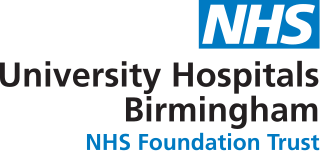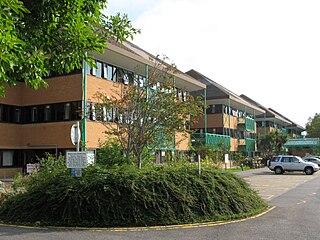Cambridge University Hospitals NHS Foundation Trust is a British public sector healthcare provider located in Cambridge, England. It was established on 4 November 1992 as Addenbrooke's National Health Service Trust, and authorised as an NHS foundation trust under its current name on 1 July 2004.

The University Hospitals Birmingham NHS Foundation Trust provides adult district general hospital services for Birmingham as well as specialist treatments for the West Midlands.

Weston General Hospital is an NHS district general hospital in the town of Weston-super-Mare, Somerset, England, operated by University Hospitals Bristol and Weston NHS Foundation Trust. As of June 2019, the hospital had 261 beds and around 1,800 clinical and non-clinical staff. It has a part-time Accident & Emergency department, an intensive care unit, an oncology and haematology day unit, and a day case unit. The hospital also has a 12-bed private unit, The Waterside Suite, wholly owned by the hospital trust, with profits being re-invested into the main hospital.

The West Midlands Ambulance Service University NHS Foundation Trust (WMAS) is responsible for providing NHS ambulance services within the West Midlands region of England. It is one of ten ambulance trusts providing England with emergency medical services, and is part of the National Health Service.
The Princess Alexandra Hospital NHS Trust serves a population of 258,000 and provides healthcare services to the communities of Harlow and the surrounding areas. It runs Princess Alexandra Hospital in Harlow, Essex, England which is a 419 bedded District General Hospital providing acute and specialist services to a local population of 258,000 people. It has been led since May 2017 by Lance McCarthy and Steve Clarke (chairman). It has a hospital radio station, Harlow Hospital Radio.

The Royal Free London NHS Foundation Trust is an NHS foundation trust based in London, United Kingdom. It comprises Royal Free Hospital, Barnet Hospital, Chase Farm Hospital, as well as clinics run by the trust at Edgware Community Hospital, Finchley Memorial Hospital, and North Middlesex University Hospital. On 1 July 2014, the Barnet and Chase Farm Hospitals NHS Trust was acquired by Royal Free London NHS Foundation Trust, making it one of the largest trusts in the country.
Bus transport in Bromsgrove has a long and varied history, dating back to Midland Red operations. In recent years, however, First Midland Red, which has evolved from the original Midland Red company, has severely reduced operations, leaving many independent operators running in the town.

Severn Freewheelers Emergency Voluntary Service is a blood bike charity based in the Severn Valley in western England. Founded in 2007, it provides a free motorcycle courier service to hospitals in the region, operating a fleet of emergency-equipped motorcycles which are ridden and co-ordinated by volunteers. Severn Freewheelers is a founder-member of the Nationwide Association of Blood Bikes (NABB) and co-operates with similar organisations in the area including Freewheelers EVS, SERV and Midland Freewheelers.
Blackpool Teaching Hospitals NHS Foundation Trust is an NHS Foundation Trust providing health services in North Lancashire, England. It runs Blackpool Victoria Hospital which is a large busy acute hospital; two smaller community hospitals - Clifton Hospital and Fleetwood Hospital; the National Artificial Eye Service; Blenheim House Child Development Centre and community health services for North Lancashire.
Heart of England NHS Foundation Trust (HEFT) was one of the largest organisations running NHS hospitals in England. The hospitals and services run by HEFT included Heartlands Hospital, Solihull Hospital and Community Services, Good Hope Hospital in Sutton Coldfield and Birmingham Chest Clinic. The trust was under the leadership of chair Jacqui Smith and chief executive David Rosser, who succeeded Julie Moore on 1 September 2018.

The Royal Devon and Exeter NHS Foundation Trust ran Royal Devon and Exeter Hospital, Honeylands Children's Centre, the Exeter Mobility Centre, and the Mardon Neuro-Rehabilitation Centre. The trust's application for NHS Foundation Trust status was approved in December 2003, which became effective on 1 April 2004.
Brighton and Sussex University Hospitals NHS Trust (Now disbanded), abbreviated as BSUH, was an NHS foundation trust ran two acute hospitals, the Royal Sussex County Hospital in Brighton and the Princess Royal Hospital in Haywards Heath. It also operated a number of other hospitals and medical facilities, including the Royal Alexandra Children's and Sussex Eye Hospitals in Brighton, Hove Polyclinic, the Park Centre for Breast Care at Preston Park and Hurstwood Park Neurosciences Centre in Haywards Heath. The Trust also provided services in Brighton General Hospital, Lewes Victoria Hospital, Bexhill Renal Satellite Unit, Eastbourne District General Hospital and Worthing Hospital.

Portsmouth Hospitals University NHS Trust is an NHS trust which provides healthcare services to Portsmouth and surrounding areas of Hampshire, and select services to a wider area. It runs the Queen Alexandra Hospital.
Derby Teaching Hospitals NHS Foundation Trust was a former NHS trust that ran Royal Derby Hospital and the London Road Community Hospital, both in Derby, together with outpatient and diagnostic services in a range of community hospitals, health centres and GP surgeries across southern Derbyshire, until its merger in July 2018 with Burton Hospitals NHS Foundation Trust, when it created University Hospitals of Derby and Burton NHS Foundation Trust.
University Hospitals Plymouth NHS Trust, formerly known as Plymouth Hospitals NHS Trust is the organisation which runs Derriford Hospital, and the co-located Royal Eye Infirmary (REI), as well as the Child Development Centre in Plymouth, Devon. The trust is an NHS trust that provides secondary health services in Plymouth and surrounding areas.
The University Hospitals of North Midlands NHS Trust was created on 1 November 2014. It runs Royal Stoke University Hospital, formerly run by the University Hospital of North Staffordshire NHS Trust and the County Hospital. It was formed after the dissolution of Mid Staffordshire NHS Foundation Trust. The trust is currently under the leadership of chair David Wakefield and chief executive Tracy Bullock.
Healthcare in Worcestershire was the responsibility of three Clinical Commissioning Groups until July 2022, covering, respectively Redditch and Bromsgrove, Wyre Forest and South Worcestershire.
Healthcare in Cornwall was until July 2022 the responsibility of Kernow clinical commissioning group, until it got replaced by Integrated care system, as a result of the Health and Care Act 2022. As far as the NHS is concerned, Cornwall includes the Isles of Scilly.

Alexandra Hospital is an acute general hospital in Redditch, Worcestershire, England. It is managed by the Worcestershire Acute Hospitals NHS Trust.

Kidderminster Hospital is an acute general hospital in Kidderminster in Worcestershire, England. It is managed by the Worcestershire Acute Hospitals NHS Trust.










